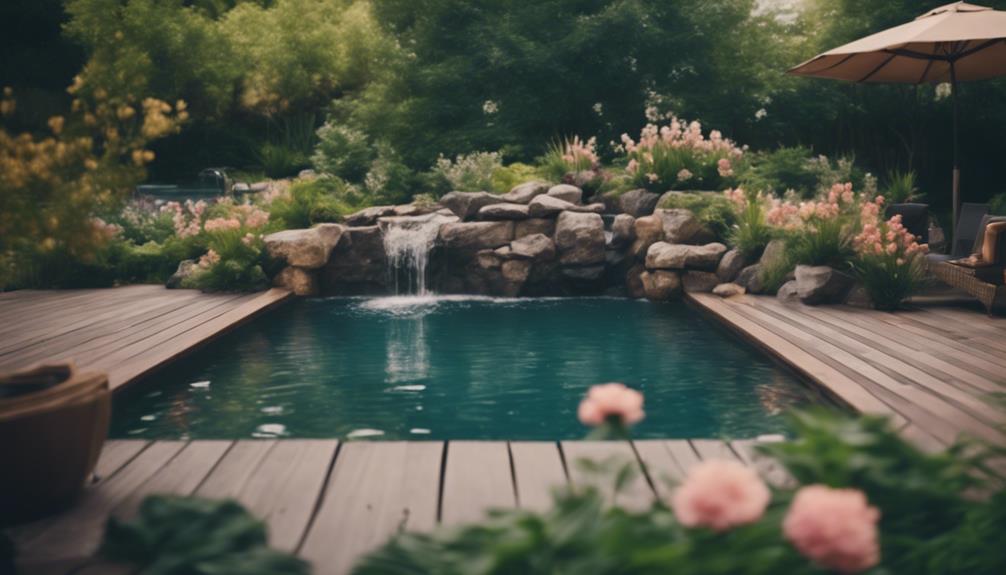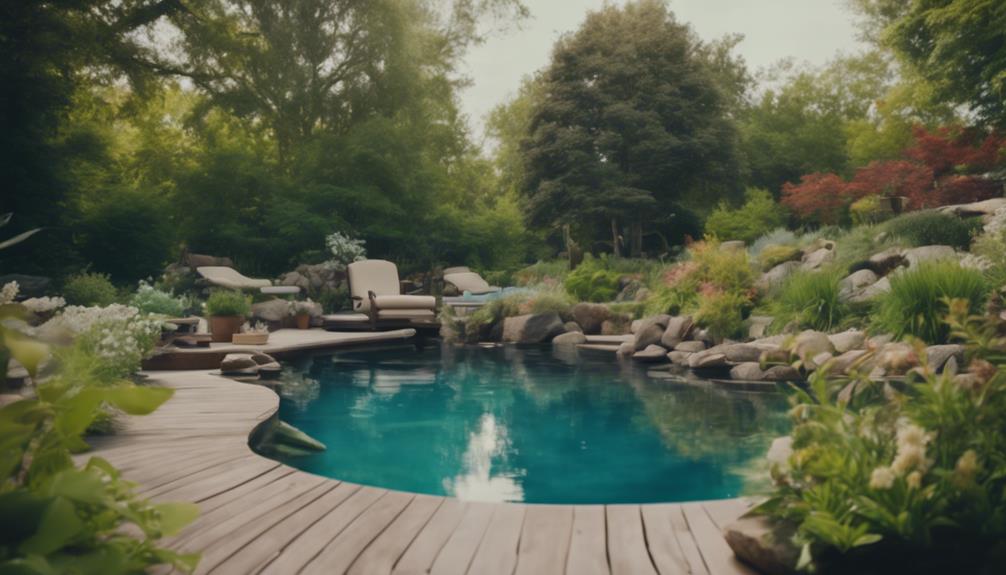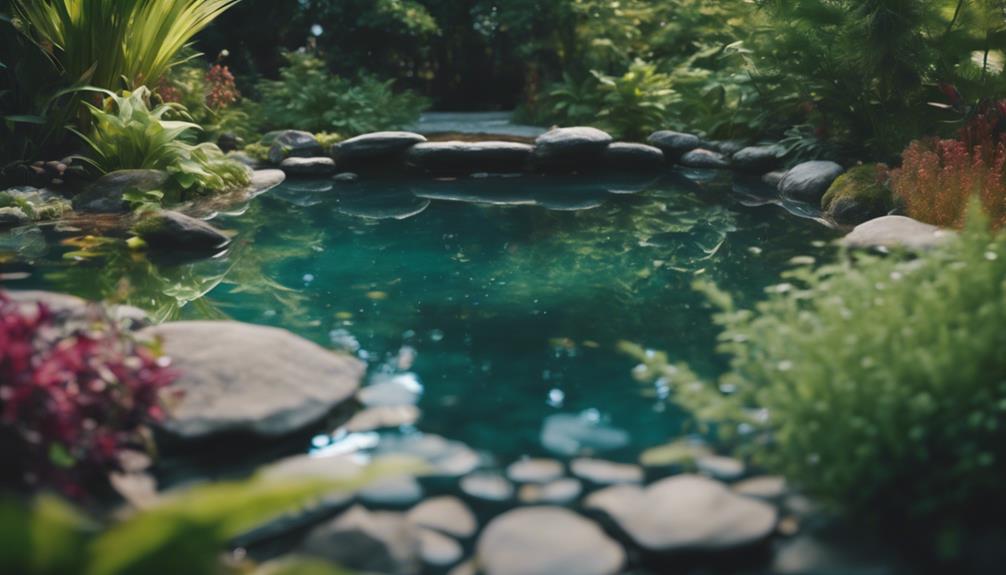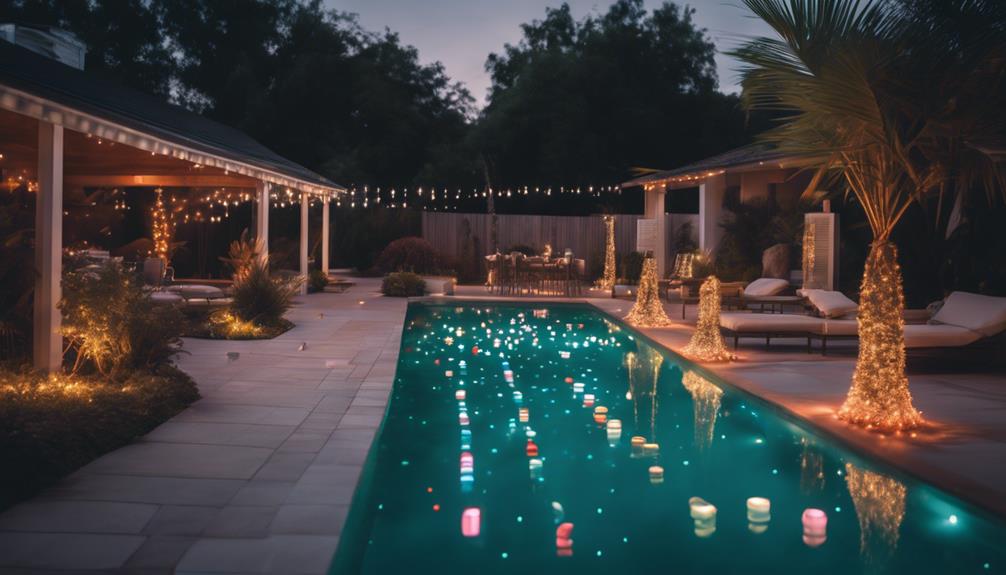Natural pools are making a enchanting resurgence, merging practicality with beauty, offering a chemical-free swimming oasis nestled in nature's splendor. These pools provide a peaceful and calm environment, popular for their classic charm and eco-friendly design. The incorporation of natural elements like rocks, gravel, and water plants guarantees a harmonious blend with the surroundings. Health benefits include safer swimming for sensitive skin and the promotion of a healthier ecosystem. Embrace the trend of natural pools for a distinctive and sustainable swimming experience that aligns with eco-friendly living. Discover more about the attraction of these paradise slices.
Key Takeaways
- Integration of natural elements for serene and sustainable pool design.
- Utilization of biological filtration systems for eco-friendly swimming experiences.
- Cost-effective solutions through efficient filtration and minimal technology.
- Harmonious blend of vintage aesthetics and modern eco-conscious living.
- Growing trend towards chemical-free pools with a garden pond appeal.
The Charm of Natural Pool Designs
What makes the design of natural pools so enchanting and appealing to eco-conscious individuals seeking a unique swimming experience?
Natural pools offer a harmonious blend of functionality and aesthetics, creating an oasis that mimics the beauty of a natural pond.
The use of perennial and hydroponic plants for filtration not only enhances the visual appeal but also promotes a sustainable and eco-friendly approach to swimming.
By seamlessly integrating with the surrounding environment through the use of stones, pebbles, and water features like waterfalls, natural pools evoke a sense of tranquility and serenity.
This design concept not only caters to the desires of individuals seeking a chemical-free swimming experience but also resonates with those who appreciate the allure of vintage aesthetics.
Health and Environmental Benefits
Natural pools offer a range of health and environmental benefits that make them a compelling choice for individuals seeking a sustainable and eco-conscious swimming experience. Unlike traditional pools, natural pools use biological water filtration systems, eliminating the need for harsh chemicals. This not only provides a safer swimming environment for individuals with sensitive skin and hair but also contributes to a healthier ecosystem by promoting the growth of beneficial aquatic plants.
Additionally, the absence of chemical treatments in natural pools reduces environmental impact, aligning with the growing trend of eco-conscious lifestyles. By choosing a natural pool, individuals not only enjoy a unique and non-chemical swimming experience but also actively contribute to the preservation of the environment.
Incorporating Nature Into Pool Design

In the world of pool design, the integration of natural elements plays a pivotal role in creating harmonious and visually appealing aquatic spaces. Incorporating nature into pool design involves blending the pool seamlessly into its surroundings, utilizing stones, pebbles, and water features like waterfalls for added aesthetic value.
The use of plants for filtration not only enhances the pool's ecosystem but also contributes to a more organic and inviting atmosphere. This design approach appeals to younger generations interested in vintage aesthetics and offers a unique, non-chemical swimming experience.
Cost-Effective Natural Pool Solutions
Utilizing efficient filtration methods can reduce operational costs for maintaining natural pools. By incorporating biological filtration systems that rely on plants like pickerelweed and water irises, natural pools eliminate the need for costly chemical treatments, leading to significant savings.
The minimal use of technology devices further contributes to cost-effectiveness by reducing energy consumption. Additionally, the possibility of repurposing the pool as an ice rink during colder months adds versatility and value to the investment.
With careful planning and consideration of cost-effective solutions, natural pools offer a sustainable and budget-friendly alternative to traditional swimming pools. By embracing these practices, pool owners can enjoy a beautiful oasis that not only benefits the environment but also their wallets.
Embracing the Natural Pool Trend

As the demand for sustainable and environmentally conscious pool options continues to rise, the trend of embracing natural pools is gaining momentum in the field of modern pool design.
Natural pools, with their emphasis on biological water filtration systems and eco-friendly design, offer an invigorating alternative to traditional chlorinated pools. By incorporating perennial and hydroponic plants for filtration and creating a garden pond aesthetic, natural pools provide a harmonious blend of nature and recreation.
This trend not only caters to individuals seeking a chemical-free swimming experience but also aligns with the broader movement towards eco-conscious living. As more people recognize the benefits of natural pools for both their well-being and the environment, the embrace of this trend is reshaping the landscape of pool design.
Frequently Asked Questions
Can Natural Pools Attract Mosquitoes and Other Insects?
Natural pools may attract mosquitoes and other insects if not properly maintained. However, strategic planning, such as utilizing mosquito larvae-eating fish or selecting specific plants, can substantially reduce insect presence, ensuring a pleasant swimming environment.
Are There Specific Plants Required for Natural Pool Filtration?
In the domain of natural pool filtration, the intrigue lies within the botanical army. Perennial heroes like pickerelweed and water irises reign supreme, purifying waters with grace. These plants, essential for filtration, bestow eco-friendly purity to aquatic domains.
How Deep Should a Natural Pool Be for Optimal Functionality?
For peak functionality, a natural pool should typically have a depth ranging from 5 to 8 feet. This depth allows for proper water circulation, balanced ecosystem development, and adequate space for plant filtration systems to effectively thrive.
Can Natural Pools Be Integrated With Traditional Pool Features?
Natural pools can be integrated with traditional pool features to create a unique swimming experience. By blending eco-friendly filtration systems with familiar pool elements, a harmonious balance between nature and modern design can be achieved.
Are There Specific Safety Concerns Unique to Natural Pools?
Safety concerns unique to natural pools include potential for algae growth, water quality fluctuations, and proper plant maintenance. Regular monitoring and understanding of ecological balance are essential. Consult with experts like Shoreline Pools for guidance.
Conclusion
To sum up, natural pools offer a harmonious blend of nature and recreation, creating an oasis of tranquility and beauty in the modern world.
Like a shimmering jewel nestled within a lush garden, these pools showcase the artistry of sustainable design and the wonders of natural purification.
Embracing the trend of eco-conscious living, natural pools stand as a tribute to the enduring allure of a paradise where man and nature coexist in perfect harmony.










